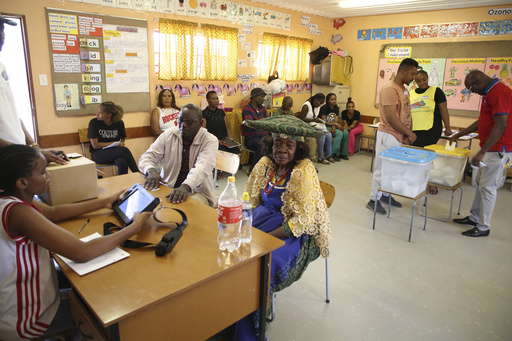
WINDHOEK, Namibia — The ruling party’s candidate has taken the lead in preliminary results from Namibia’s presidential election. However, these results have come under scrutiny due to technical difficulties that necessitated an extension of the voting period by three days.
Opposition parties have rejected the outcomes from the election, claiming the extended voting was conducted illegally, which they argue has compromised the integrity of the elections in a country noted for its generally smooth electoral processes and recognized as one of the more stable democracies in Southern Africa. The final results are anticipated later this week, with opposition groups indicating plans to contest the election’s legitimacy in court.
The elections, held last Wednesday, faced several challenges, including a shortage of ballot papers, which prompted election officials to keep certain polling stations open until Saturday to accommodate voters.
These complications cast a shadow over the results, as Vice President Netumbo Nandi-Ndaitwah from the ruling SWAPO party aims to become Namibia’s first female leader. The 72-year-old Nandi-Ndaitwah, a veteran of Namibia’s independence movement, received approximately 56% of the votes in the partial results disclosed on Monday, based on around 220,000 of the estimated 1.4 million ballots that were cast. Meanwhile, Panduleni Itula, representing the opposition Independent Patriots for Change, trails with 27% of the votes.
Namibian citizens voted not only for a president but also for the composition of Parliament in the country’s extensive, yet sparsely populated, landscape that features vast desert regions. Since gaining independence from the apartheid regime in South Africa in 1990, Namibia has been ruled by the SWAPO party.
Even with the prospect of a historical election, SWAPO has faced increasing dissatisfaction among the populace, particularly with high unemployment rates and various economic challenges, especially affecting the youth. The party’s reputation as the liberator of the country has also been jeopardized by corruption scandals.
The Independent Patriots for Change announced their intention to file a legal challenge against the election results this week, alongside other opposition parties that plan to join the effort.
“This matter goes beyond just an election; it’s about the democratic credentials of our nation and ensuring the government serves everyone, both the affluent and the underprivileged. It cannot be solely for those seeking to cling to power by any means necessary,” stated McHenry Venaani, the leader of the opposition Popular Democratic Movement and a presidential candidate.
The Electoral Commission of Namibia has stated that there will not be a new election, dismissing the calls for a re-run by opposition parties. This year has seen a trend of discontent among ruling parties in the southern African region.
In South Africa, the ruling African National Congress, once led by Nelson Mandela, lost its majority after 30 years, forcing them to form a coalition to continue governing. The Botswana Democratic Party, after 58 years in power since gaining independence from Britain, was unexpectedly ousted. Additionally, the ruling party in Mauritius was defeated by a significant margin, and Mozambique’s Frelimo party faced allegations of election rigging, leading to widespread protests against its prolonged rule.
